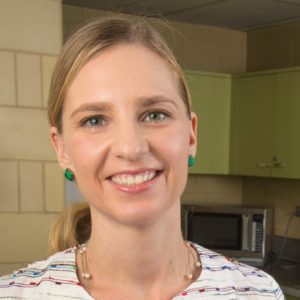Rutgers Global Health Institute core faculty member Shauna Downs has received a grant from the Eunice Kennedy Shriver National Institute of Child Health and Human Development to study behavior change communication strategies to improve infant and young child nutrition in Senegal.
Downs is an assistant professor in the Department of Urban-Global Public Health at the Rutgers School of Public Health. She will use this grant to determine the impact of a mobile health messaging intervention on infant and young child feeding practices and to examine the implementation challenges and opportunities for increasing future mobile health messaging programs.
Malnutrition, the primary risk factor for morbidity and mortality in Senegal, disproportionately impacts infants and young Senegalese children. Children that lack good nutrition often experience numerous adverse health outcomes, like poor physical growth and cognitive development, lower academic achievements and financial stability, and increased risk for obesity and diet-related non-communicable diseases later in life.
Limited resources, including too few community health workers, present obstacles that interfere with the uptake of recommended nutritional practices.
 “In order to positively change the trajectory of malnutrition in young children, people need to first be able to access accurate nutrition information,” Downs says. “We know that mobile phone technology is frequently utilized by the Senegalese population. This enables us to strategically message, using both voice and text, parents of young children about recommended infant and young child feeding practices, ultimately allowing us to provide them with information about best practices.”
“In order to positively change the trajectory of malnutrition in young children, people need to first be able to access accurate nutrition information,” Downs says. “We know that mobile phone technology is frequently utilized by the Senegalese population. This enables us to strategically message, using both voice and text, parents of young children about recommended infant and young child feeding practices, ultimately allowing us to provide them with information about best practices.”
The project has “the potential to yield positive nutritional outcomes for young children while generating valuable new findings that could be used to guide future mobile health communications to increase health education outreach,” she says. A food systems researcher, Downs studies the implementation of food policies and the role of policies and interventions related to sustainable production and consumption of nutritious foods. In 2018, she received a seed grant from Rutgers Global Health Institute to support her research related to strengthening vegetable value chains to improve nutrition in a Kenyan slum.
Collaborators on the new project in Senegal include: Joachim Sackey, assistant professor in the Department of Clinical and Preventive Nutrition Sciences at Rutgers School of Health Professions and a core faculty member of Rutgers Global Health Institute; practitioners from the Institut de Recherche en Santé de Surveillance Epidemiologique et de Formation in Senegal, including Souleymane Mboup, founder and CEO, Moussa Sarr, principal investigator and head of development, and Daouda Gueye, project manager; Ashraful Alam, senior research fellow in medical anthropology and international public health from the University of Sydney; Tracey-Lea Laba, associate professor in the Centre for Health Economics Research and Evaluation at the University of Technology, Sydney; and Jessica Fanzo, Bloomberg distinguished professor of global food policy and ethics at the Berman Institute of Bioethics of Johns Hopkins University.

